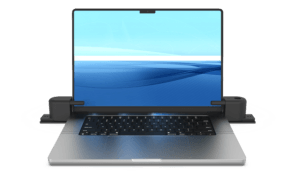Alternatives to Kensington Locks: Enhanced Retail Theft Protection for Laptops

Laptops are one of the top 10 most popular items for retail theft. More than 9 times out of 10 they’re never recovered. Protecting high-value merchandise like notebooks, desktop computers, and gaming laptops can be difficult for retailers, especially if they don’t want to compromise the shopping experience. Kensington Locks (K-Locks) have been the standard for over three decades for their reliability and ease of use, but it’s only a matter of time before even the most reliable technology receives an update. For retailers struggling to implement loss prevention measures for these devices, discover why a K-Lock may not be what you need and some different solutions on the market.

Kensington Locks are laptop cable locks that were developed in the 1980s. It functions in the same way a cable bike lock would. You loop the cable around something sturdy and then place the lock head into a small slot on your device and lock it into place using a combination or key. They gained traction in the early 1990’s and became so popular in fact, that a T-bar, or Kensington Slot has become an industry standard, being built into over 95% of notebooks, monitors, printers, and projectors.
What many retail stores don’t know is that K-Locks were not designed for retail security settings or for products that will be unattended for extended periods of time. Since nearly 50% of all laptop theft occurs in offices and classrooms, they’re better used to deter “snatch and grab” thieves or for more personal applications. Think of small businesses using notebooks in their IT departments to store valuable data, or someone working in a co-working space or coffee shop that may leave their notebook unattended to use the restroom or take a call.
Of course, notebooks don’t look the same as they did 20 years ago, becoming more powerful and much slimmer. Kensington has kept up with the trends, creating devices that fit USB ports (soon to be phased out), and Nano slots. That still doesn’t account for retail displays or laptops without K-Slots, like the beloved MacBook.

Laptop Lock is the latest solution for stores in high-theft areas or with limited employees and security guards. The modular track design is perfect for small spaces or for displaying multiple products in a row.
It operates using a single key, meaning staff can unlock products quickly for fast merchandising and customer interaction. Is the floor model the last item in stock? No problem, unlock it in seconds to make the sale. Since it doesn’t rely on a K-Slot to secure notebooks, it can be used with all brands.
Laptop Lock doesn’t just improve operations but dramatically improves the customer’s shopping experience. The small form of the brackets doesn’t block the screen or keyboard so customers get an authentic feel for the product.

There’s a reason Kensington has been the industry standard for so long. If you need a small-scale solution or value the ease of use in your business, InVue’s K-Lock is a great alternative for any device with a K-Slot. As the name implies, it works for valuables with a Kensington Slot, but the difference is the ability to alarm the product. In the event a thief tries to yank or cut the attached cable, an alarm will sound.

Laptop AOP (alarm on product) is a budget-friendly solution to protect electronics sans K-Slot. It uses a powerful adhesive that attaches the alarm directly to the laptop, monitor, etc. The adhesive can only be removed using a specialized tool, so you don’t have to worry about a person simply peeling it off.
Both solutions are easy to install and deliver reliable security and a seamless experience for shoppers. As a bonus, both loss prevention devices rely on a single key to operate, making them easy to scale and maintain.
Most brands would agree that the in-store shopping experience is top priority for their business, but finding a way to bridge the experience with asset protection has always been a formidable challenge. All our products put shoppers at the forefront of our design process and provide unparalleled access control via the use of OneKEY or wireless scanning technologies.
With better access control via OneKEY, you can get a report on insightful data about your store, like the products customers are interacting with the most, streamline daily store operations for employees, and increase your bottom line with more efficient product management.
Contact InVue today for better solutions to protect your assets and keep shoppers coming back.